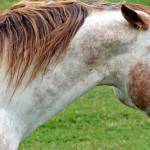Question
I have an eight-year-old Hanoverian gelding in moderate body condition. Right now, he is doing lower-level dressage work five days a week, about an hour each day. He’s stalled 16 hours a day. His current ration consists of 2 lb (0.9 kg) soaked alfalfa pellets (weighed dry), 3/4 lb (0.35 kg) of concentrate per day, and lots and lots of hay. He won’t eat any ration balancer that I’ve offered him. I treat him daily for ulcers with omeprazole. My dilemma: he’s so listless and lazy under saddle. How can I boost his energy level?
Answer
From the information you provided, I have identified two dietary goals: (1) meet your gelding’s basic nutrient needs with a complete and balanced diet; and (2) provide a diet that will support improved stamina and energy levels during ridden exercise.
To meet nutritional needs, I recommend adding a micronutrient supplement, such as Micro-Max (in Australia, look for Gold Pellet). A small amount will provide all the trace minerals and vitamins needed to balance his forage-based diet. Micro-Max is extremely palatable, so I don’t think you will have the same feed-refusal issue you have had with ration balancers.
To improve stamina under saddle, you may have to shift the way you provide energy to your gelding. The energy produced from high-fiber diets, like the one fed to your gelding, is predominantly in the form of volatile fatty acids, products of microbial fermentation in the hindgut. This slow-release energy source is best used for long-duration, low-intensity exercise. Horses asked to perform moderate or intense exercise for short periods, like yours, require supplemental sources of nonstructural carbohydrates (NSC) for production of rapidly available energy.
Manipulating energy sources in the diet can have a positive impact on behavior and energy levels, though some horses seem unaffected by dietary changes. I recommend adding a calorie-dense feedstuff like stabilized rice bran or plain oats to your gelding’s diet, as both provide a source of NSC. Depending on your gelding’s response to these higher-NSC feeds, you may find that only 0.5-1 lb (0.23-0.45 kg) of oats or stabilized rice bran is needed for improved stamina and energy. Both of these feedstuffs are suitable for a horse with a history of gastric ulcers and at the low feeding rate should not cause unwanted weight gain.
Proper electrolyte supplementation is key for performance horses. Electrolyte deficiencies can have a significant impact on performance, including hastening fatigue. Access to free-choice salt year-round and electrolyte supplements prevent electrolyte deficiencies in performance horses. Adding Restore SR (Restore in Australia) to the diet will ensure electrolyte requirements are met.








